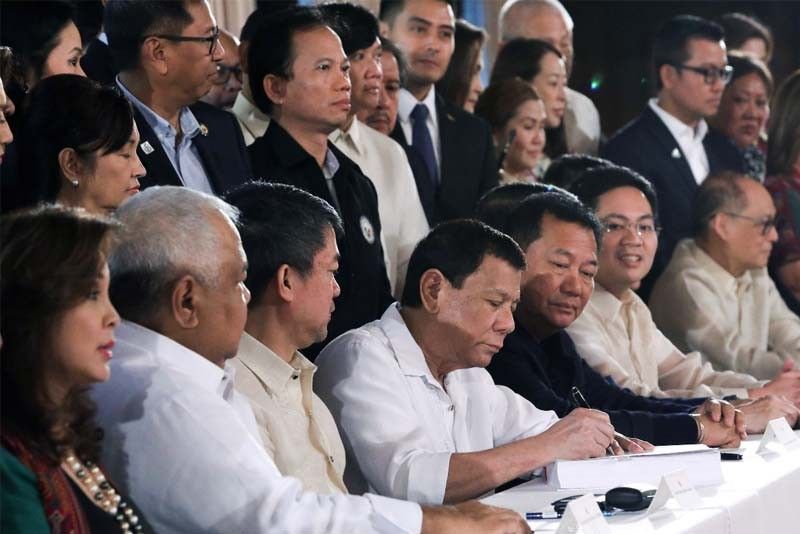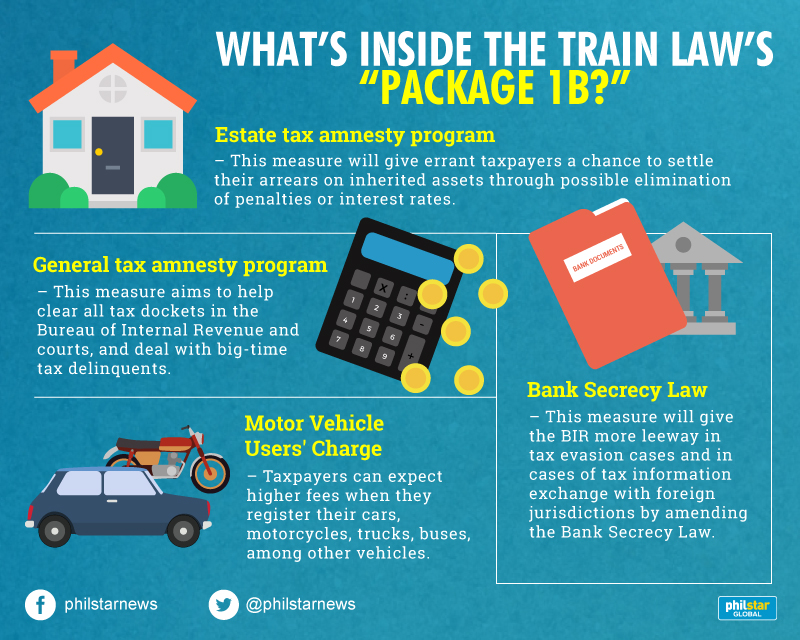What to expect from TRAIN law's 'Package 1B'

President Rodrigo Duterte is flanked by lawmakers as he leads the Ceremonial Signing of the 2018 General Appropriations Act (GAA) and Tax Reform Acceleration and Inclusion (TRAIN) in Malacañan Palace on December 19, 2017. Presidential photo/Rey Baniquet
MANILA, Philippines — While consumers are still trying to adjust their budgets following the enactment of the first package of the tax reform program, the Department of Finance is now pressing Congress to pass “Package 1B” of the law after it fell short of revenue targets.
On December 19, President Rodrigo Duterte signed into law Republic Act No. 10963, or the Tax Reform for Acceleration and Inclusion law, which aims to generate revenue to fund a multibillion-peso infrastructure program that is key to the government's ambitious economic agenda.
The TRAIN law is the first package of the administration’s much-awaited Comprehensive Tax Reform Program. It took effect last January 1.
According to the government’s 2018 budget program, the projected revenues under the TRAIN bill were originally estimated at P134 billion in the first year of its implementation. However, the final version of the measure was estimated to generate just P89.9 billion.
The DOF earlier said the remaining third would come from TRAIN “Package 1B” — a measure essential to maintaining the government’s 3 percent of gross domestic product fiscal deficit target.
Finance Secretary Carlos Dominguez III said Congress is expected to pass Package 1B within the first quarter of the year.
What’s package 1B?
Package 1A of the TRAIN Act constitutes the measures that Duterte already signed into law last month, which included the reduction of personal income tax rates and higher excise levies on petroleum and automobiles, among others.
The DOF said Package 1B comprises the estate tax amnesty program, a general tax amnesty program, and amendments to the bank secrecy law and automatic exchange of information.
Also in the second phase of TRAIN is the the proposed adjustments in the Motor Vehicle Users' Charge that would impose higher registration fees for all motor vehicles on top of increasing excise tax on petroleum products and automobiles brought by Package 1A.

Package 1B is expected to raise an additional revenue of P38.9 billion.
Dominguez earlier said the planned tax amnesty program might include the elimination of penalties or interest rates, after noting that some taxpayers cannot pay penalties as the interest rate can go as high as 20 percent per annum. He also said the program will cover arrears on property tax, estate tax, income tax and those with pending tax cases.
For pending cases, the finance chief said the goal is to “clear up” court dockets by allowing taxpayers to settle “at least 40 percent or whatever percent they (legislators) desire.”
Senate President Pro Tempore Ralph Recto, Senators Paolo Benigno Aquino IV and Sonny Angara with Nancy Binay, have filed separate bills seeking to grant a general amnesty for unpaid taxes from 2015 and prior years.
Meanwhile, a substitute bill granting amnesty in the payment of outstanding estate taxes for taxable year 2016 and prior years has been approved by the House of Representatives.
The Philippines implemented several tax amnesties in the past but these have generally been unsuccessful.
The last tax amnesty law was passed in 2007-08 while Pampanga Rep. Gloria Macapagal-Arroyo was president. That amnesty raised revenues of less than 0.1 percent of GDP.
The DOF said the Duterte administration’s tax amnesty program is projected to generate around P26 billion, depending on who will avail the program.
READ: Tax amnesty plan faces hurdles – Credit Suisse
Bank Secrecy amendments
Another component of Package 1B is the amendments to the Bank Secrecy Law, which would give the BIR commissioner more leeway in tax evasion cases and in cases of tax information exchange with foreign jurisdictions.
Finance undersecretary and Chief Economist Gil Beltran was quoted as saying in reports that the national government was unable to collect an estimated P668.34 billion in taxes annually due to the bank secrecy law, or around 33.7 percent of its total yearly tax revenues.
Senators Juan Miguel Zubiri, Leila De Lima, Aquilino Pimentel III and Panfilo Lacson have filed separate bills to exclude government officials and employees from the prohibition against disclosure of or inquiry into bank deposits while financial regulators are batting for the repeal of the bank secrecy law.
"No succeeding packages means either a breach of this deficit which will hurt our economy or a cut in government spending, possibly compromising the President’s infrastructure program," Dominguez said.
- Latest
- Trending






























